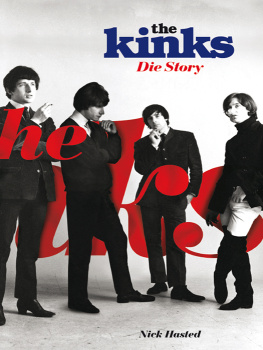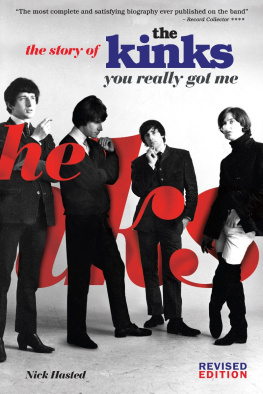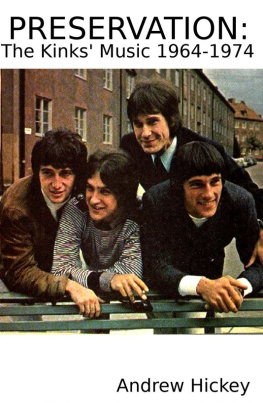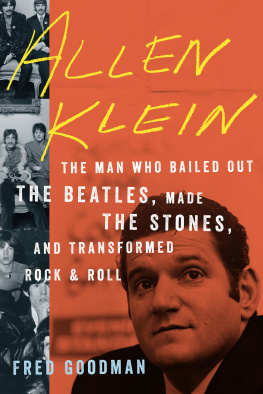The Kinks
Tempo
A Rowman & Littlefield Music Series on Rock, Pop, and Culture
Series Editor: Scott Calhoun
Tempo: A Rowman & Littlefield Music Series on Rock, Pop, and Culture offers titles that explore rock and popular music through the lens of social and cultural history, revealing the dynamic relationship between musicians, music, and their milieu. Like other major art forms, rock and pop music comment on their cultural, political, and even economic situation, reflecting the technological advances, psychological concerns, religious feelings, and artistic trends of their times. Contributions to the Tempo series are the ideal introduction to major pop and rock artists and genres.
The American Songbook: Music for the Masses, by Ann van der Merwe
Bob Dylan: American Troubadour, by Donald Brown
Bon Jovi: Americas Ultimate Band, by Margaret Olson
British Invasion: The Crosscurrents of Musical Influence, by Simon Philo
Bruce Springsteen: American Poet and Prophet, by Donald L. Deardorff II
The Clash: The Only Band That Mattered, by Sean Egan
The Kinks: A Thoroughly English Phenomenon, by Carey Fleiner
Kris Kristofferson: Country Highwayman, by Mary G. Hurd
Patti Smith: Americas Punk Rock Rhapsodist, by Eric Wendell
Paul Simon: An American Tune, by Cornel Bonca
Ska: The Rhythm of Liberation, by Heather Augustyn
Sting and The Police: Walking in Their Footsteps, by Aaron J. West
Warren Zevon: Desperado of Los Angeles, by George Plasketes
A Thoroughly English Phenomenon
Carey Fleiner
ROWMAN & LITTLEFIELD
Lanham Boulder New York London
Published by Rowman & Littlefield
A wholly owned subsidiary of The Rowman & Littlefield Publishing Group, Inc.
4501 Forbes Boulevard, Suite 200, Lanham, Maryland 20706
www.rowman.com
Unit A, Whitacre Mews, 26-34 Stannary Street, London SE11 4AB
Copyright 2017 by Carey Fleiner
All rights reserved. No part of this book may be reproduced in any form or by any electronic or mechanical means, including information storage and retrieval systems, without written permission from the publisher, except by a reviewer who may quote passages in a review.
British Library Cataloguing in Publication Information Available
Library of Congress Cataloging-in-Publication Data
Names: Fleiner, Carey, 1965 author.
Title: The Kinks : a thoroughly English phenomenon / Carey Fleiner.
Description: Lanham : Rowman & Littlefield, [2017] | Series: Tempo: a Rowman & Littlefield music series on rock, pop, and culture | Includes bibliographical references and index.
Identifiers: LCCN 2016033939 (print) | LCCN 2016034764 (ebook) | ISBN 9781442235410 (cloth : alk. paper) | ISBN 9781442235427 (electronic)
Subjects: LCSH: Kinks (Musical group) | Rock musicEnglandHistory and criticism.
Classification: LCC ML421.K56 F54 2017 (print) | LCC ML421.K56 (ebook) | DDC 782.42166092/2 [B]dc23 LC record available at https://lccn.loc.gov/2016033939
 TM The paper used in this publication meets the minimum requirements of American National Standard for Information Sciences Permanence of Paper for Printed Library Materials, ANSI/NISO Z39.48-1992.
TM The paper used in this publication meets the minimum requirements of American National Standard for Information Sciences Permanence of Paper for Printed Library Materials, ANSI/NISO Z39.48-1992.
Printed in the United States of America
Series Editors Foreword
The Kinks: A Thoroughly English Phenomenon
In 2017, the Kinks timeless Waterloo Sunset reaches its fiftieth anniversarya song ostensibly about the simple and the ordinary in peoples lives, where the scene of a daily commute becomes a paradise. Ray Davies has remarked that a song he wrote about a Londoner now belongs to everyone. With its serendipitous timing, I welcome this examination of the Kinks into the Tempo series fold, in which Carey Fleiner reminds us with her energetic, deeply informed examination of one of the more popularand populistBritish Invasion bands that it is thoroughly English to make the future keep up with a bit of the past. The Kinks knew how to do the backward glance, not only into the personal histories of its own Ray and Dave Davies but also into the historically home-front concerns that felt thoroughly English to the Davieses and, judging by their success, with fans: a sense of permanence, place, and self-rule for the ordinary man and woman, such that enough time in the day was preserved for having a bit of fun as well. Keeping these concerns central to any plan for the future felt right for the Kinks, and it found some sonic inspiration for a way forward in the traditions of American blues and rock. Challenging tides that must have felt they could wash out the ordinary, homely values of the commoner were part of the serious playfulness the Kinks specialized in, and because the Davieses got neither too precious nor too debauched to remain relevant, they persevered as an influence on popular culture and as a comment on what does, in fact, persevere.
Fans and scholars alike still find culturally relevant conversations buoyed by the Kinks and see in the wide-ranging musical styles in the bands catalog and in the Davieses solo projects the accomplishments of artists. As popular music makes a space for gathering around shared feelings, memories, hopes, and dreams, it should also be where a critical examination of all those things takes place, which Fleiner does exceedingly well, bringing her understanding of the motifs of classical literature to bear on her appreciation of the Kinks. She looks beyond the heights of the Kinks success to explore the quests each Davies brother found he had to take and how the vital themes of popular culture tie into the most personal of our quests. She helps us understand the epic in the ordinary in the songs and lives of the Davieses and in their art, which is their attempt to chart a course for fans through the 1960s and beyond, which were, upon reflection, as much of an era of change as every era, including right now.
Scott Calhoun
Timeline
Cultural events | The Kinks |
September 1939: Britain declares war on Germany. |
1940: Battle of Britain; evacuation of Dunkirk. |
1942: The Beveridge Report lays the foundation of the welfare state in Britain (which includes the foundation of the National Health Service in 1948). |
December 31, 1943: Pete Quaife was born. |
February 15, 1944: Mick Avory was born. June 21, 1944: Ray Davies was born. |
May 1945: VE Day over Germany; Hitler commits suicide. August/September 1945: surrender of Japan. 19451951: Clement Atlee (Labour), prime minister (PM). Rationing continued throughout his tenure in office. Military conscription is revived, and Britain is drawn into the Korean War. |
ca. 1947ca. 1991: the Cold War between the Soviet Bloc and Western powers | February 3, 1947: Dave Davies was born. |
1948: Britain hosts the Austerity Gamesthe name given to the Olympics as rationing is still in effect. |
1951: The Festival of Britain, a morale booster for British confidence during the postwar era (Ray remembers visiting attractions on the South Bank of the Thames that were part of this). Winston Churchill becomes PM (until 1955), and rationing ends during his tenure. |














 TM The paper used in this publication meets the minimum requirements of American National Standard for Information Sciences Permanence of Paper for Printed Library Materials, ANSI/NISO Z39.48-1992.
TM The paper used in this publication meets the minimum requirements of American National Standard for Information Sciences Permanence of Paper for Printed Library Materials, ANSI/NISO Z39.48-1992.